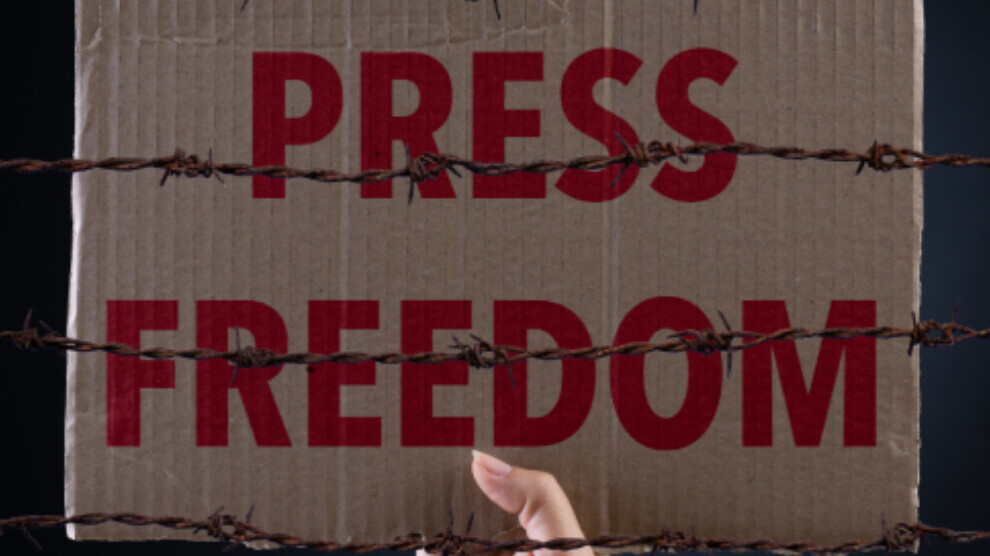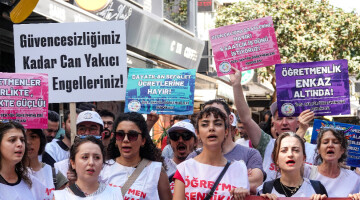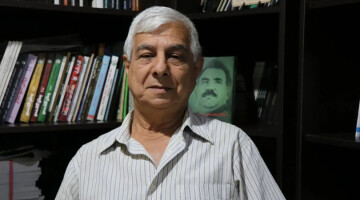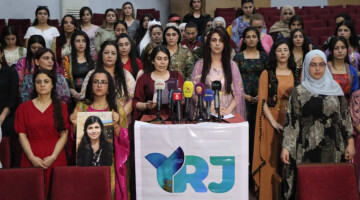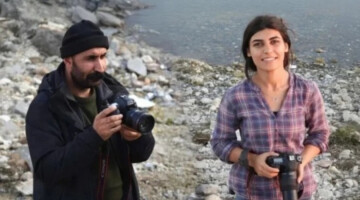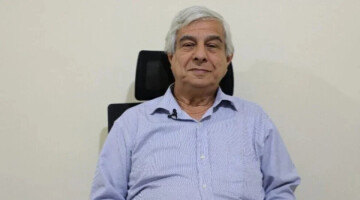The government prefers to be a mere spectator in the face of the illegal and discriminatory practices of the Radio and Television Supreme Council (RTÜK), the Communications Directorate and the Press Advertisement Institution, which threaten with penalties and discriminatory press card and public ad procedures in order to weaken the pluralistic media and independent reporting.
Upon a request by RTÜK, which on February 9 gave 72 hours to international news sites to apply for a license, the Ankara Judgeship imposed an access block on Deutsche Welle and Voice of America (VOA), which hadn't applied for a license on the grounds that it would pave the way for censorship. The practice brought the common problem of licensing procedures and access blocking in Turkey to the international level.
Arbitrariness of the police and the period of impunity
The BİA Media Monitoring Report regarding April, May and June also showed that arbitrary interferences of the Security forces with media representatives in order to silence the critical community were tolerated. In the last three months, nine of the 17 journalists lost their freedom while reporting on social protests. Also, 12 of the 19 journalists who were attacked in the same period were the target of the security forces.
In the last three months, Turkey had one of its darkest and tragic periods in terms of seeking justice in murders of journalists: Turkey transferred the file of the journalist Jamal Khashoggi, who was killed at Saudi Arabia's Consulate General in İstanbul in 2018, to this country, which it accuses of instigating the murder.
In the file of the journalist Musa Anter, who was killed in 1992, no progress was made in the trial even though it was confessed in the Susurluk Report that he had been killed by the state. The case concerning the murder, which will mark its 30th year in September, in under the threat of statute of limitations. Lawyers of the Dink family brought the case concerning the killing of Agos newspaper Editor-in-Chief Hrant Dink in 2007 in Şişli, İstanbul, to the Court of Cassation on the grounds that "not all aspects of the murder were the subject of the case."
17 journalists were arrested, 1 was released
In April, May and June, at least 17 journalists were arrested. Among those people, İbrahim Haskoloğlu, who was arrested for "obtaining personal information with illegal methods," was released after a week. The 16 journalists in Diyarbakır were sent to prison on the suspicion of "being a member of an illegal organization" and "propagandizing for a terrorist organization."
In the same period, at least 17 journalists were detained on the job. Nine of the journalists were detained while covering public protests where Security officers act in an increasingly arbitrary manner (Gezi commemoration, Pride March, Gemlik March etc.). Among these reporters, AFP photojournalist Bülent Kılıç was detained by being battered two years in a row.
Attacks on 19 journalists, online attacks and threats on five women journalists
In the last three months, at least 19 media representatives were attacked: Illustrator Hicabi Demirci and Cumhuriyet newspaper columnist Barış Pehlivan were threatened. Also, five women journalists (Çiğdem Toker, Nevşin Mengü, Burcu Karakaş, Hale Gönültaş and Seyhan Avşar), were subjected to threats and verbal attacks online.
12 of the 19 attacked journalists were targeted by the police
Despite the recent Constitutional Court judgments convicting the administration regarding the journalists Beyza Kural, Erdal İmrek and Gökhan Biçici being subjected to police violence and the annulment of the General Directorate of Security's circular dated April 27, 2021, by the Council of State, widespread violence and unlawful interventions against journalists continue.
In this period, 12 of the 19 attacked journalists were on the target of the police: AFP photojournalist Bülent Kılıç, just like in the same period last year, was detained while performing his duty of covering the Pride March in İstanbul on June 26. In the investigation regarding the first incident of detention, which resulted in journalism organizations holding a protest in front of the İstanbul Governor's Office with the slogan "We Can't Breathe," there has been no result for a year. On the other hand, organizations such as the TGS and DİSK Basın-İş, continue filing criminal complaints, with the latest ones being about the Gezi Commemoration.
Three journalists were sentenced for "propaganda" and "Berkin"
In April, May and June, three journalists (Abdurrahman Gök, Eren Keskin and Reyhan Çapan) were sentenced to 1 year, 6 months and 22 days in prison for "propagandizing for a terrorist organization" and to pay a fine of 25 thousand Turkish lira for "disclosing the identity of Berkin Elvan."
In this period, the journalists who faced five years in prison in the BDDK case on the allegation of "economic coup," Kerim Karayaka, Fercan Yalınkılıç, Mustafa Sönmez, Merdan Yanardağ, Sedef Kabaş and freelance journalist Orhan Kalkan were acquitted. The Diyarbakır appeals court overturned a prison sentence of 6 years and 3 months for İMC TV Program Coordinator Ayşegül Doğan for "being a member of an illegal organization." While the decision of acquittal for "Mehmet Aslan" for "being a member of an illegal organization" became final, convictions of Eren Erdem, Emre Erciş and Turan Atabay for "aiding the Fetullahist Terrorist Organization" were overturned by the court unanimously.
"Insulting the president": 13 journalist defendants, one acquitted
In the period of April, May and June, at least 13 journalists and cartoonists (Julien Serignac, Gerard Biard, Laurent Sourisseau, "Alice", Hasan Cemal, Deniz Yücel, Rüstem Batum, Mehmet Emin Kurnaz, Erk Acarer, Burak Şahin, Ender İmrek, Engin Korkmaz and Ahmet Sever) faced a total of 60 years and 8 months in prison on the allegation of "insulting the president" because of their views and criticism about President Erdoğan. In this period where no verdict of conviction was given, journalist Hasan Cemal was acquitted. The case opened against Evrensel newspaper columnist Ender İmrek was new.
Local courts in Turkey continue trials regarding article 299 of the Penal Code (TCK) despite a Venice Commission recommendation and the ECtHR's Vedat Şorli conviction in October 2021. Between when Eroğan was elected the president in August 2014 and June 1, 2022, at least 70 journalists were given a prison sentence, a deferred prison sentence or a monetary fine on the basis of TCK article 299 titled "insulting the President."
"Insult" sentences for Saymaz and Dündar
In April, May and June, at least 21 journalists stood trial in cases filed against them for "insult." While journalists İsmail Saymaz and Uğur Dündar, for whom complaints were filed by Büreyde Önel of the Kadiri Order and former Prime Minister Binali Yıldırım, respectively, were sentenced to pay a total of 13 thousand 980 lira of monetary fines, ETHA Agency responsible manager Derya Okatan and Saymaz, in another case, were acquitted.
Among those who requested prison sentences for journalists were President Erdoğan's son Bilal Erdoğan, Presidency Communications Director Fahrettin Altun, Judge Bekir Altun, MHP Leader Devlet Bahçeli, the last Prime Minister Binali Yıldırım, Mustafa Şentop and Mustafa Varank, Kadiri Cult leader Büreyde Öncel, the then-Chief Prosecutor of The Court of Cassation Abdurrahman Yalçınkaya, and Turkish Wushu Federation (TWF) Deputy Chair Abdurrahman Akyüz.
One of the pleasing news of this period came from the Van Prosecutor's Office: AKP Van deputy Osman Nuri Gülaçar's complaint against journalist Yasin İpek ended in non-prosecution with the message "public figures should be more tolerant of criticism."
Erdoğan's sons-in-law seek compensation
In April, May and June, five reporters, one columnist (Sedat Yılmaz, Hazal Ocak, İsmail Arı, Yusuf Karadaş and Ceren Sözeri) and four newspapers faced to pay 825 thousand lira in compensation as part of lawsuits filed by President Erdoğan's sons-in-law, Selçuk Bayraktar and Berat Albayrak, and Selçuk Bayraktar's brother, Haluk Bayraktar.
Among these cases, the one that President Erdoğan's son-in-law Selçuk Bayraktar filed requesting 150 thousand lira was rejected while the case that Selçuk Bayraktar and his brother Haluk Bayraktar filed against BirGün newspaper and its reporter İsmail Arı requesting 250 thousand lira ended in a heavy conviction of 200 thousand lira.
Access to DW and VOA blocked, 45 online news articles censored
Upon a request by the RTÜK, which on February 9 gave 72 hours to international news sites to apply for a license, the Ankara 1st Penal Judgeship of Peace imposed an access block on Deutsche Welle and Voice of America (VOA), which hadn't applied for a license on the grounds that it would pave the way for censorship. The practice brought the common problem of licensing procedures and access blocking in Turkey to the international level.
In the last three months, Penal Judgeships of Peace or the Access Providers Union, imposed access blocks on at least 45 online news and journalism articles that brought up or criticized allegations of corruption, bribery and favoritism.
Constitutional Court president requested a law from the parliament
In the April-June 2022 period, the Constitutional Court concluded that the Kayseri Yeni Haber newspaper's conviction after a lawsuit by former CHP deputy Haluk Pekşen was a violation of freedom of expression and the press, and ruled that the newspaper should be paid 13 thousand 500 lira for immaterial damages and 4 thousand 865 lira for court costs.
The Constitutional Court ruled that journalist and author Can Dündar's spouse Dilek Dündar's right to privacy and family life was violated because of the revocation of her passport and Dilek Dündar should be paid 22 thousand lira for immaterial damages. Constitutional Court President Zühtü Aslan, at a ceremony for the 60th anniversary of the Constitutional Court where President Erdoğan also attended, addressed Parliamentary Speaker Mustafa Şentop: "If we want individual applications to continue to be an effective and efficient way of seeking rights, we, as the legislative organ, must make the legal arrangements regarding this issue without delay."
The ECtHR doesn't work, but it is popular
In the April-June 2022 period, no decisions of the European Court of Human Rights (ECtHR) regarding press freedom could be found. In the same period, the ECtHR turned down appeals against Turkey's convictions in the files of Deniz Yücel, a Die Welt reporter who had been arrested in Turkey for a year, and journalist Nazlı Ilıcak, who spent over four years behind bars. Journalist Müyesser Yıldız, whose lawsuit because of her arbitrary arrest in 2020, was rejected by the Constitutional Court, stated that she would apply to the ECtHR.
The MEdia and Law Studies Association (MLSA) applied to the ECtHr in the name of the Mezopotamya Agency (MA) reporter Cemil Uğur, who was arrested after reporting on two villagers who were tortured after being taken to a helicopter in Çatak, Van, and was later acquitted of "being a member of an illegal organization." MLSA filed another application for NEdim Türfent, who was sentenced to 8 years and 9 months in prison in Hakkari in 2017 because of "being a member of the PKK."
RTÜK fined TV outlets 1 million 430 thousand 85 lira
The Radio and Television Supreme Council (RTÜK), issued a total of 37 administrative monetary fines on TV outlets in the three-month period. The council fined TV outlets a total of 1 million 430 thousand 85 lira. In the same period last year, the council issued 46 monetary fines and 20 days of broadcast suspension fines on TV outlets and 1 administrative monetary fines on radio outlets. It has fined TV outlets a total of 11,300,517 lira and radio outlets 6,372 lira.
"Becoming a mother" now makes journalists lose their jobs
In the April-June period, at least three media representatives were dismissed or had to quit their jobs because of disagreements arising from the outlet's editorial line. Journalist Emin Çapa returned to Halk TV, which he had previously left. The reason for the dismissal of journalist Zeynep Irmak Öcal, who was working for the Demirören News Agency (DHA) in Samsun, was that "she became a mother."

